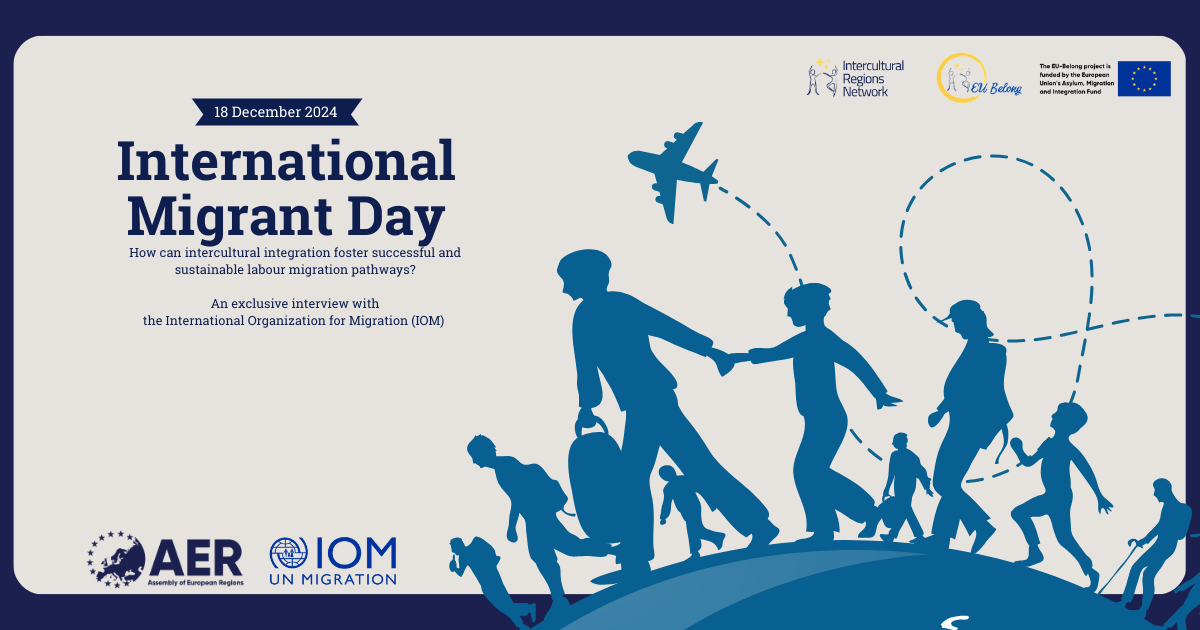 Share this!
Share this!On World Migration Day 2024, The Assembly of European Regions is pleased to release an exclusive interview, produced in collaboration with the International Organization for Migration (IOM) Country Office for Belgium and Luxembourg. The interview bridges two flagship AMIF-funded initiatives coordinated by the organisations: EU-Belong and Displaced Talents for Europe. While doing so, it demonstrates the need to promote interculturally inclusive society, where skills are nurtured, and talents are unlocked, driving the transition towards a digital, green, and inclusive European future.
Give a chance to displaced individuals, because their enthusiasm, passion to contribute, and dedication know no bounds.
(Ammar Kolko, displaced professional relocated to Belgium under DT4E)
Displaced Talents for Europe (DT4E) is one of the frontrunning initiatives – coordinated by the International Organization for Migration (IOM) Country Office for Belgium and Luxembourg and funded by the European Union (EU) – to ensure safe labour migration pathways to Europe. With an increasingly shrinking population on the one side and the need to attract skills on the other, today’s challenge is impacting heavily on the European economy. Shaping new opportunities for labour migration represents not only a chance to enhance Member State’s financial performance, but also to accelerate the transition to a digital and green future.
Regions face the consequences of these disrupting dynamics, which can be solved only by embracing an intercultural perspective. The work done by EU-Belong represents a valuable example to enhance creativity, realise innovation ecosystems, and promote social dialogue in regional territories. By unifying their strengths and leveraging synergies, IOM and the AER can amplify the significant impacts of their initiatives, transforming “How People Work and Create”. This interview shows the respective potential of EU-Belong and DT4E, as well as other IOM-led labour migration initiatives, inviting public authorities to join forces and contribute in the realisation of safe pathways and welcoming communities.
We thank IOM Belgium & Luxembourg for the availability to release this interview, sharing great insights and inspiring experiences with the Assembly of European Regions’ network and members.

DT4E is focused on promoting labour migration as a solution to Europe’s talent gap and demographic challenges. Could you share what is the benefit of labour migration for Europe and what impact you are aiming to achieve?
In Europe, employers across various industries are indeed facing a shortage of skilled workers in the local labour markets, as a result of the twin (green and digital) transition and the natural decline of the working-age population, among others. This labour and skills gap creates substantial pressure on local economies and makes it difficult for employers to find the workforce they need.
As the Country Office for Belgium and Luxembourg of the International Organization for Migration (IOM), the UN Migration Agency, we address this shortage by creating safe and legal labour pathways to Belgium and other European countries. Some of our initiatives focus specifically on skilled individuals who are forcibly displaced. Many of these individuals have valuable qualifications, skills, and work experience but face barriers in accessing employment and mobility opportunities due to their displacement status. Through the EU-funded Displaced Talent for Europe (DT4E) initiative, displaced individuals can access job opportunities in Europe and build stable futures and fulfilling careers in new environments that recognize their skills and experience. Simultaneously, European employers gain access to an untapped pool of international talent, allowing them to fill shortages, build an inclusive workforce, and contribute to increased diversity in the European labour market.
In addition to DT4E, at IOM Belgium and Luxembourg we also work to establish safe labour mobility pathways for other populations. For instance, our Learning Mobility Scheme between Tunisia and Belgium connects talented Tunisian graduates with Belgian companies, offering them valuable internship and traineeship experiences. This cross-border programme not only provides practical experience to young professionals from Tunisia and enhances their employability, but it also expands and diversifies the talent pool available to Belgian employers, fostering a sense of global collaboration. Similarly, our Skills Mobility Partnership between Suriname and Belgium links Belgian healthcare employers with Dutch-speaking healthcare professionals from Suriname, who can work in Belgian hospitals and elderly care facilities either temporarily or permanently. This partnership is mutually beneficial and grounded in reciprocity, as support is provided by Belgian employers and partners to simultaneously build the capacity of Suriname’s healthcare system.
What are the main challenges you encounter in creating safe labour migration pathways to Europe? How are you overcoming these obstacles?
Despite strong political support across Europe for safe labour migration pathways, policy and legislative frameworks have yet to align to allow for their development at scale. One of our main challenges is the legal and administrative complexity of work permits and visa pathways. The extensive requirements for these permits and visas disproportionately affect displaced talents due to the difficulty in obtaining certain documents such as international passports, proof of legal residence, and character checks. The very long processing times, up to six months for the single permit alone, also serve to discourage employers from engaging in international recruitment in general. To address this, IOM collaborates closely with public and private stakeholders to advocate for policy adjustments that streamline these processes. In Belgium, for instance, the authorities appointed contact persons in each relevant service to discuss and address any issue that may arise in the application processes for displaced talents. Protection safeguards were also secured, as well as a certain level of flexibility for some required documents, including character checks and expired documents. In the UK, where DT4E was already preceded by the so-called Displaced Talent Mobility Pilot, a dedicated desk at the Home Office was created and displaced talents have been granted access to the existing fast-track visa process free of charge.
Diploma and skills recognition is another significant hurdle when it comes to regulated sectors such as the healthcare and legal sectors. International talents, including displaced individuals more specifically, often face challenges in having their professional qualifications recognized in Europe and in accessing job opportunities at their skills and qualification level. To help, we work with educational institutions and licensing bodies on both sides (countries of origin/first asylum and countries of destination) to expedite and facilitate the recognition process where possible.
Lastly, the practicalities of integration can also pose a broad challenge for newcomers, such as language barriers and access to affordable housing. We’re addressing this by working with local stakeholders, establishing links with existing integration services, and encouraging employers to provide initial (practical and financial) support with housing and language training. We’re also exploring the potential of innovative financing solutions that would be able to cover settlement costs.



EU-Belong supports regional governments in developing intercultural integration strategies. Based on your experience, what role can regional governments play in establishing and supporting safe labour migration pathways?
Regional governments are uniquely positioned to play a critical role in this process. They are crucial to enabling the smooth integration of international professionals, including displaced talent, into local communities. For example, providing access to language courses and cultural orientation programmes equips newcomers with the skills and knowledge essential for successful integration. In Belgium, our partnership with the Flemish Integration Agency (AgII) allowed for talents recruited through DT4E to gain access to online pre-departure integration classes free of charge. This pilot is currently being evaluated and will hopefully become a structural offer for migrant workers preparing to relocate to Belgium.
Ensuring access to safe and affordable housing is equally crucial for stability; regional governments can collaborate with housing authorities and NGOs to offer housing support.
Additionally, fostering community engagement through events, partnerships with diaspora groups, and social integration initiatives can build meaningful connections between newcomers and local residents. Regional authorities and services are also well placed to support access to healthcare, including mental health services, for displaced talent and other migrant workers. This can be done by structurally providing newcomers with information on available healthcare services, assisting with registration processes, and simplifying administrative procedures. Regarding mental health specifically, they can establish or fund community-based mental health programs by partnering with NGOs and community health organizations. Together, these efforts create a holistic approach to integration, benefiting both displaced individuals and the communities that welcome them.
Regions can also play a crucial role in raising awareness and building confidence among employers regarding these pathways. A primary challenge is helping employers, many of whom may be unfamiliar with hiring displaced talent, to feel equipped and prepared to engage with new talents. In the Belgian context, Flanders has launched numerous initiatives to support and facilitate international recruitment. For example, International Houses are being launched in various provinces to serve as physical hubs offering comprehensive assistance with relocation, social integration, and navigating life and work in different regions of Flanders. Additionally, websites like “Work in Flanders” and “Your Future in Flanders, let’s make it work” allow foreign professionals to access job vacancies open to international recruitment and extensive information about living and working in Flanders, contributing to making the region an increasingly attractive destination.
Finally, through targeted outreach and partnerships with regional stakeholders, such as chambers of commerce or public employment agencies, regional governments can inform businesses of the benefits of hiring skilled foreign talent, addressing potential concerns and highlighting available support resources. By guiding employers in understanding the value of these programs, regional governments can help them become ambassadors for complementary pathways.
Can you tell us about some of the success stories so far?
Across Europe, we’ve had the privilege of welcoming 114 displaced talents along with 43 family members through DT4E, each bringing unique skills and experience. One of the most recent arrivals is Ammar, a Syrian national who was displaced to Jordan and arrived in Belgium with his family in late July. Ammar has begun work at a leading food processing and shipping company, making this employer the first in Belgium to hire and integrate a displaced talent through DT4E.
Ammar described the moment he received his job offer as “unforgettable,” sharing: “I had mixed emotions that cannot be described in words. The chain that had held me back for years was finally broken.” His arrival marked a new stage in this labour migration pathway to Belgium. In the coming months, 16 other talents are set to arrive, as they complete pre-departure language and orientation courses to ensure a smooth transition into their new roles.
Ammar also had an inspiring message for employers, encouraging them to give a chance to displaced individuals “because their enthusiasm, passion to contribute, and dedication know no bounds.”

Looking ahead, what are your plans for continuing this mission? How can the EU-Belong and DT4E networks collaborate to support each other in advancing inclusive societies and creating sustainable labour migration pathways?
We’ve recently launched the second phase of DT4E, known as DT4E 2.0, which upscales the existing pathway in Belgium and establishes similar pathways to France and Slovakia. We will also continue to advance our healthcare-focused Skills Mobility Partnership with Suriname and our Learning Mobility Scheme for interns and trainees from Tunisia. We are also committed to conceptualizing and developing new, innovative pathways that facilitate talent mobility to Europe, ensuring diverse and sustainable solutions for addressing labour market needs across the region.
To make these labour pathways scalable and sustainable, supporting the smooth and successful integration of newcomers into their communities will be key. The expertise and insights of EU-Belong are instrumental in guiding regional governments, as well as public and private stakeholders, toward effective strategies for integrating displaced talent across Europe. At the same time, we as IOM can share our experiences and lessons learned from DT4E and other labour mobility pathways in regard to supporting both talents and employers throughout every stage of the recruitment process. This collaborative knowledge will help to refine and strengthen our common goals. Looking ahead, we see great potential to amplify our impact by promoting a comprehensive approach to migration and integration. We hope to encourage a shift in mindset, where employers and other stakeholders see the hiring of displaced individuals as an opportunity to enrich their workplaces and communities, innovate, and thrive in an interconnected world.
Are you a public authority interested in developing safe migration pathways?
- Have a look at the Displaced Talent for Europe website: https://belgium.iom.int/displaced-talent-europe-dt4e
- Explore the IOM Belgium & Luxembourg’s website on labour migration: https://belgium.iom.int/labour-migration-and-migrant-integration
- Get inspired by the work that EU-Belong regional authorities are developing to foster a more inclusive European community: https://eu-belong.aer.eu/
About the project
EU-Belong is a 3-year project co-funded by the Asylum, Migration and Integration Fund of the European Union. Coordinated by the Assembly of European Regions (AER) within the framework of its Intercultural Regions Network (IRN), it is implemented in partnership with ten regional authorities from seven European countries: Arad and Timiș in Romania; Catalonia and Navarra in Spain; Donegal in Ireland; Emilia-Romagna in Italy; Leipzig in Germany; Pomerania and Poznan in Poland; Salzburg in Austria; and two technical partners: ART-ER Attrattività Ricerca Territorio and Istituto Economico Cooperazione Internazionale (ICEI).
Stay up to date with all updates by following EU-Belong on X/Twitter @EU_Belong
For questions, please contact Emanuela Pisanó, EU-Belong Project Manager at [email protected]
